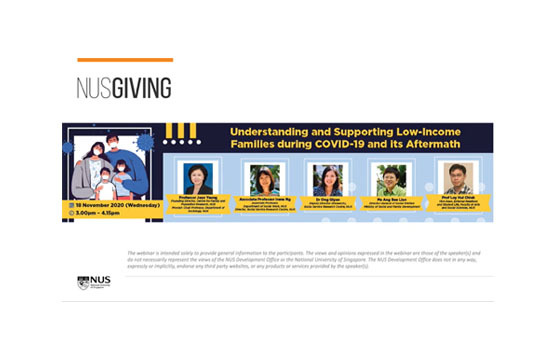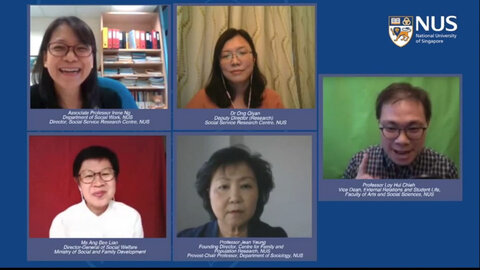It is often the low-income families that are most adversely affected as they struggle with new norms

Beyond the spread of the disease itself, COVID-19 has had far-reaching consequences on economies around the world. In this unprecedented situation, it is often the low-income families that are most adversely affected as they struggle with new norms, leading to long-term individual and societal impacts.
Moderated by Prof Loy Hui Chieh, Vice Dean, External Relations and Student Life, Faculty of Arts and Social Sciences, National University of Singapore (NUS), a lively dialogue between the panellists during the NUS Giving Webinar Series titled Understanding and Supporting Low-Income Families during COVID-19 and its Aftermath, provided insights into the challenges that low-income families face and the impact of the pandemic.
“During the Circuit Breaker period, one of the main challenges that low-income families faced was the great income uncertainty as jobs were lost or at a standstill all of a sudden,” related Dr Ong Qiyan, Deputy Director (Research), Social Service Research Centre, NUS.
“They also faced anxieties about COVID-related risk because for some of them, especially essential workers, it was a choice between not having food on the table or risk exposing themselves to the virus by going to work.”
Professor Jean Yeung, Founding Director, Centre for Family and Population Research, NUS and Provost-Chair Professor, Department of Sociology, NUS also provided a bigger picture of the pandemic’s impact on families in Singapore.
“What COVID-19 has done is to magnify the pre-existing inequalities among different families. On one side, we have families who experience major income loss or the loss of jobs. On the other side, there are those who are saving or perhaps, even earning more – these families are happy to be able to spend more time together as a family during the pandemic. There is also an uneven impact among family members of the same household, for example, men and women, the young and the old. We need to be concerned about the aftermath of these short-term and long-term impacts.”

Going forward, the emphasis will be on bridging the digital divide so as to empower low-income families.
“In the initial phase of the Circuit Breaker period, there was a scramble to provide digital resources like refurbished laptops and internet dongles to the low-income families. However, some of the laptops are no longer working properly and need replacement, while internet dongles are not a long-term solution. Now that we know that digital access is no longer a choice or luxury but a need, the question is how to ensure continued access?” asked Associate Professor Irene Ng, Associate Professor, Department of Social Work, NUS and Director, Social Service Research Centre, NUS.
Prof Yeung cautioned that children’s digital need is beyond having access to the hardware. We need to pay attention to what children are doing on the electronic devices. SG LEADS data show that young children in low-income families spend much more time on these devices, mostly on smart phones, than children in other groups in watching movies, shows or playing games, and more frequently unsupervised.
Issues of digital literacy, information gaps and the stigma of seeking help were also emphasised during the dialogue.
Ms Ang Bee Lian, Director-General of Social Welfare, Ministry of Social and Family Development pointed out that developing a strong support social support network is vital, especially during these times.
“Having people on the ground is extremely important. The government or the planning committee are at the centre, much like the palm of your hands, while the people on the ground are the fingers helping to reach out to as many individuals as possible. They help to build relationships, provide moral support and even form friendships. People who are struggling are looking for such connections.”
Ms Ang also highlighted the importance of such relationships during the COVID-19 pandemic and elaborated on how low-income families can tap on them for assistance and support in their journey during this difficult time.
“The only way to understand how people are feeling and what they are going through is to talk to them. We should see them as fellow Singaporeans who are in a different situation from ours, and talk to them to understand what it means to live in poverty – then we will know how to help,” continued Dr Ong.
Associate Prof Ng urged those who are keen to lend a hand: “Don’t just sit in the armchair, come down and get involved in the community.”
For further information on the NUS Giving Webinar Series, contact the Events team at dvoevents@nus.edu.sg.






